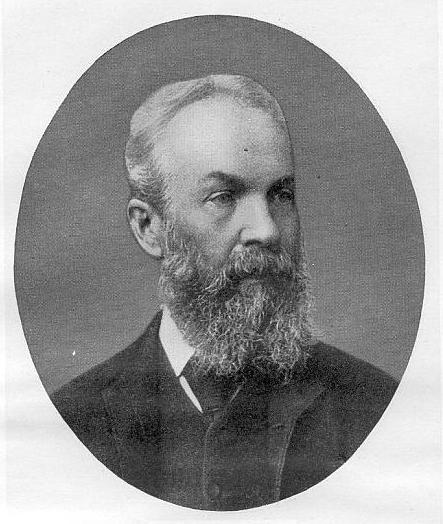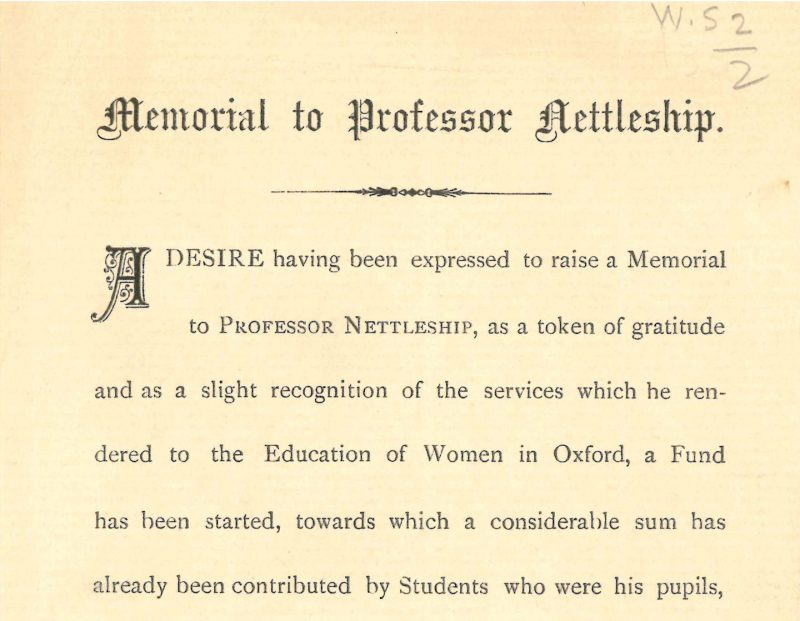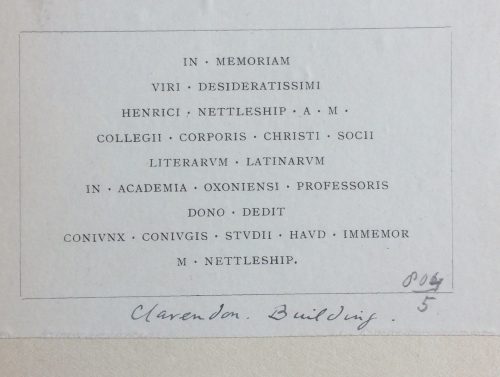The Nettleship Collection is the official name for the Library of St Anne’s College.
Why Nettleship?
Henry Nettleship (1839–1893) was a Classics scholar described by the ODNB as ‘shy, diffident, hesitant, and sometimes abrupt in manner, inclined to hero-worship, and with a strong sense of injustice’. His wife is more generous in her memorial to him as “an original and delightful companion in a tête-à-tête with one or two friends” [p.xx, Lectures and Essays]
After early academic successes and a period teaching at Harrow, Nettleship married in 1870 and returned to Oxford in 1873 to take up a post as Fellow of Corpus. It was only around this time that University statutes had been lifted which prohibited fellows from marrying. In this climate of changing attitudes towards women, the movement for their education began to take off. Academics and their wives worked together to organise lectures for women and Henry Nettleship helped to set-up the Association for Promoting the Education of Women in Oxford (A.E.W.) in 1878, becoming their main Latin tutor and joining the first committee.

“He had always taken an interest in women’s education, and as early as 1865 lectured on Latin to a class of ladies in Oxford”
[p.xxxiii, Lectures and Essays]
Falling ill in 1882, Nettleship was diagnosed with a weak heart. Told not to be too physically active, he continued with his academic work, spending mornings in the Bodleian and lecturing women students on weekday afternoons. When his brother (Balliol Fellow Richard Lewis Nettleship) died tragically on the slopes of Mont Blanc in 1892, the shock sent Henry into a slow decline which culminated with his death in July the following year.
“Henry Nettleship’s death was a personal loss to very many beyond his family and friends. First, perhaps, among these may be counted the women students, for whom he had done so much.”
[p.xxxiii, Lectures and Essays]
In January 1895 Nettleship’s widow Matilda donated a large number of his books to the A.E.W. and collections to the tune of £53 were raised by Miss E. Price and Miss A. M. Sellar for a fund to support the purchase of Classics books in his name. The University matched this with a donation of £40 and together, these and the Nettleship collection comprised 750 books. Office space in the attics of the Clarendon Building (at that time used by University administration, and now by the Bodleian Libraries) had been made available for the A.E.W. in the late 1800s and so it was here that Nettleship’s books came to rest, established as the Nettleship Library.

The Early Years
In December 1895 The Fritillary, a collaborative publication between the women’s colleges, included an announcement from S. Gurney (Hon. Librarian) about the opening of the Nettleship Library at the start of that year. Books were to be kept in the office of the A.E.W. and could be taken out during morning office hours. During the afternoon, reference access was available but no borrowing.
The Library would be open and free to all members of the A.E.W. and run by an annually elected Library Committee. A librarian would be appointed every three years to oversee the daily running of the Library. [p.3, 1895, A.E.W. Rules Appendix]
Professor Nettleship’s library was almost entirely Classical and the £53 Nettleship fund had been raised for the purchase of further Classics books. Separate gifts were made for Modern History and Mathematics books but it was certainly not a well-rounded collection in 1895. The Fritillary article suggests that attempts had been made to supplement the ‘hall’ libraries as far as possible so that the Nettleship Library was a useful resource for women students. For members of The Society for Oxford Home-Students with no hall at all, it was vital.

The sense of community about the A.E.W. and the Nettleship Library is apparent in its mentions over the next decade or so in The Fritillary. There are reports of surplus subscriptions raised by student society memberships being spent on extra books for the Library, as well as appeals and thanks for the donation of books by women who had completed their study.
By the end of the 1895-6 academic year, the Librarians of Lady Margaret Hall, Somerville College and St Hugh’s Hall had been elected to the Library Committee, several new donations had been received and the collection of books numbered 986 volumes. [p.9-10, 1895-1896, A.E.W. Annual Report]
In 1897, the Council of the A.E.W. raised a further £40 for the purchase of History and English books, though also reported that such History books as were currently available were not being well used. This fund was joined by a donation from a second Mrs Nettleship, this time the widow of Henry’s brother (Richard) Lewis, who donated her husband’s personal library of philosophical works to broaden and expand the Library collection. An Assistant Librarian, Miss Bonner, was appointed to support Miss Elinor R. Price (Hon. Librarian) and together they presided over a collection of a little over 2000 books.
In 1900 Frances M. Wells, the Hon. Librarian, wrote a warm descriptive piece about the Library which is best read in its entirety (here) but includes passages such as:
“the A.E.W. office is not merely an office; it is a spacious, cheerful, book-lined room, which even those who enter it only to pay their fees can hardly fail to appreciate. And here the student may feel assured that the particular volume, of her particular subject, which she most particularly wants, is waiting and longing for her on the particular shelf allotted to it. If it is not there to-day, it will be to-morrow, for our Library is steadily growing, and will soon contain (if the student insists) all that she may want.”
[pp.313-4, March 1900, The Fritillary]

Expansion
By 1900, the initial 750 books had grown to over 2,500 and were in danger of overflowing the A.E.W. office into its antechamber. Wells’s description is clear about the generosity of the whole Oxford community in making gifts towards the Library and closes with something about the suggestion and purchase policy:
“There are not many institutions which openly inculcate mendicity, but our library adds this to its other claims on your interest, that it likes you to ask, and urges you to beg, and we can guarantee that the really importunate student will obtain her request.”
[p.314, March 1900, The Fritillary]
University academics giving lectures for the A.E.W. often donated their subscriptions for the purchase of relevant books in their subject and this, combined with the introduction of fines for overdue loans and the continued support of benefactors, meant that the Library had a small income for collections, shelving, rebinding and other administrative costs.
In 1901, a letter printed in The Fritillary appeals to the ‘hard-worked Librarian’ for an increase in opening hours so as to accommodate students attending lectures from 11am to 1pm, who would otherwise be unable to take out books. At the same time, much was being said in the Oxford Magazine about the presence of women in the Bodleian (open to women since the early 1880s) who purportedly used the reading rooms there as a sort of waiting-room between lectures. To ease this tension, and to accommodate the ever growing Library, the A.E.W. were granted an additional large room in the Clarendon Building to be fitted with tables, chairs and pots of ink. This new Reading Room doubled the space previously available and meant that the Library could start a reference collection, most significantly with the purchase of a set of the Dictionary of National Biography.
For the A.E.W.’s members, particularly the Home Students, with no college or hall around which to structure their community in these early years, the Nettleship and its Reading Room must have been a focal point. It is said that at the end of term the ‘Nettleship Cab’ made its way around Oxford, collecting up books and returning them to the Clarendon Building where a relay of students would pass them up the stairs and back into the Library [p.8, St Anne’s College, Oxford: An informal history].
Bibliography
- Association for Promoting the Education of Women in Oxford. [1895-]. Association for the Education of Women, Oxford : Home Students : Annual Report.
- Association for Promoting the Education of Women in Oxford. [1895] Rules of the Association for Promoting the Education of Women in Oxford: Appendix to Rules.
- Bywater, I. [2004]. ‘Nettleship, Henry (1839–1893), Latin scholar’ – Oxford Dictionary of National Biography. (Retrieved 6 Feb. 2018, from http://www.oxforddnb.com/view/10.1093/ref:odnb/9780198614128.001.0001/odnb-9780198614128-e-19912)
- The Fritillary [1894-1931?] (https://issuu.com/oxfordwomenscollegeshub)
- Nettleship, Henry, and F. Haverfield [1895]. Lectures and Essays. Second Series. Oxford: Clarendon. (http://solo.bodleian.ox.ac.uk/OXVU1:LSCOP_OX:oxfaleph011241770)
- Reeves, M. [1979]. St Anne’s College, Oxford : An informal history. Oxford: St Anne’s College. (https://solo.bodleian.ox.ac.uk/permalink/44OXF_INST/35n82s/alma990123366450107026)
- St Hugh’s Club Paper (https://issuu.com/oxfordwomenscollegeshub)
- Stray, C. [2007]. Oxford classics : Teaching and learning, 1800-2000. London: Duckworth. (https://solo.bodleian.ox.ac.uk/permalink/44OXF_INST/q6b76e/alma990165583210107026)
This article was written and researched by Duncan Jones (Reader Services Librarian) building on research by Clare White (Librarian).